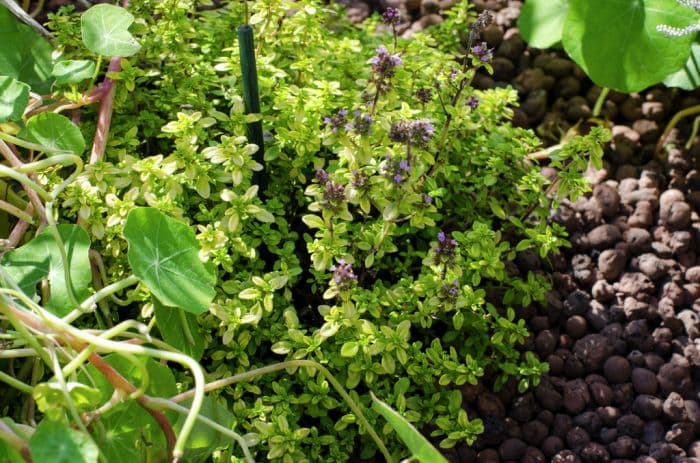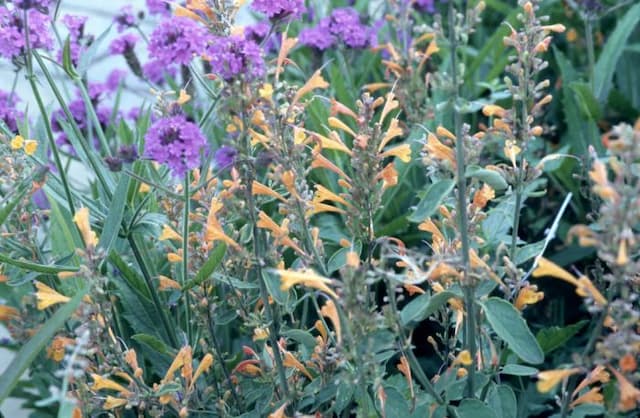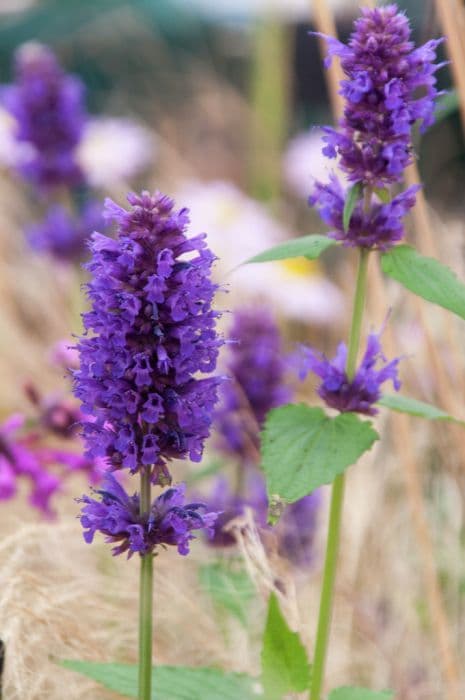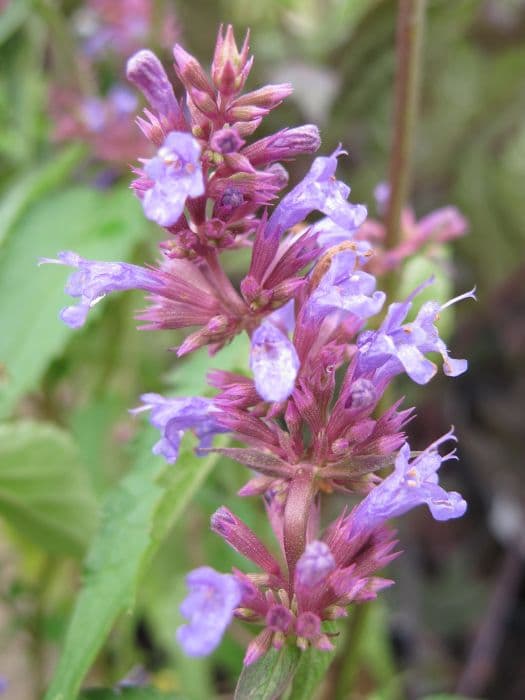Lemon Thyme Thymus pulegioides 'Archer's Gold'

ABOUT
Thymus pulegioides 'Archer's Gold,' commonly known as lemon thyme, is a vibrant herb known for its striking golden-yellow foliage that can brighten any garden space. The leaves of the lemon thyme are small, oval-shaped, and slightly curved, exhibiting a fine texture that softens as the plant matures. The plant emits a delightful lemon scent when the leaves are bruised or crushed, adding a sensory pleasure to the visual beauty. During the flowering season, lemon thyme produces tiny lilac to pink flowers that cluster at the tips of its stems, providing a delicate contrast to the golden leaves and attracting bees and butterflies. The overall shape of the plant is often spreading and mounding, creating a lush, ground-hugging carpet of color. With its colorful foliage and pleasant aroma, lemon thyme 'Archer's Gold' is frequently used as an ornamental addition in garden borders, rock gardens, and as a fragrant, low-maintenance ground cover.
About this plant
 Names
NamesFamily
Lamiaceae
Synonyms
Archer's Gold Thyme, Lemon-scented Thyme, Large Thyme
Common names
Thymus pulegioides 'Archer's Gold'.
 Toxicity
ToxicityTo humans
Archer's Gold thyme is generally considered non-toxic to humans when used in the small quantities customary for culinary purposes. However, consuming it in unusually large amounts or in an undiluted essential oil form could potentially cause gastrointestinal upset or allergic reactions in sensitive individuals. It is always recommended to exercise caution and consult with a healthcare provider if experiencing symptoms after handling or ingesting any plant.
To pets
Archer's Gold thyme is also generally considered non-toxic to pets. It is not known to cause significant poisoning or serious health issues in animals when ingested in small, typical garden exposure amounts. As with any non-food plant, if a pet consumes large quantities of it, they might experience mild gastrointestinal upset. If any concerning symptoms arise after a pet consumes this plant, it is advisable to contact a veterinarian.
 Characteristics
CharacteristicsLife cycle
Perennials
Foliage type
Evergreen
Color of leaves
Golden
Flower color
Pink
Height
6 inches (15 cm)
Spread
18 inches (45 cm)
Plant type
Herb
Hardiness zones
5
Native area
Europe
Benefits
 General Benefits
General Benefits- Aesthetic Appeal: Archer's Gold thyme adds a splash of color with its golden-yellow foliage, especially vibrant in spring and fall.
- Culinary Use: Its leaves can be used as a flavorful herb in cooking, commonly used to season meats, soups, and stews.
- Drought Resistance: Once established, it is highly tolerant of dry conditions, requiring minimal watering.
- Low Maintenance: This plant requires little care beyond occasional trimming to keep its shape.
- Pollinator Friendly: Blooms attract bees, butterflies, and other beneficial insects, supporting biodiversity.
- Ground Cover: Excellent for covering ground quickly, helping to crowd out weeds and reduce soil erosion.
- Deer and Rabbit Resistant: Its scent and taste tend to deter these animals from grazing on it.
- Fragrance: The leaves emit a pleasant scent when crushed, which can be enjoyed in gardens or when used indoors.
- Winter Interest: Retains its foliage in winter, providing year-round visual interest in the garden.
- Easy to Propagate: Can be easily propagated from cuttings or by division, allowing for garden expansion or sharing with others.
- Edging and Borders: Serves well as a border plant along paths or garden edges due to its compact growth habit.
- Cultural Significance: Often used in traditional and symbolic plantings, such as in knot gardens or herbal lawns.
 Medical Properties
Medical Properties- Antimicrobial: Thymus pulegioides contains compounds that may help inhibit the growth of certain bacteria and fungi.
- Antispasmodic: It has been used traditionally to alleviate spasms, particularly in the digestive system.
- Antitussive: The plant has been historically used to help relieve coughs.
- Carminative: It may help reduce gas and bloating in the digestive tract.
- Expectorant: Thymus pulegioides may aid in clearing mucus from the respiratory tract.
 Air-purifying Qualities
Air-purifying QualitiesThis plant is not specifically known for air purifying qualities.
 Other Uses
Other Uses- Thyme 'Archer's Gold' can be used as a natural dye, producing shades of green or yellow, depending on the mordant used.
- This plant can serve as a lawn substitute in garden settings due to its low-growing, creeping habit, offering a fragrant and attractive groundcover.
- Used in companion planting, Thyme 'Archer's Gold' can enhance the growth of surrounding plants and repel certain pests with its strong scent.
- Incorporated into potpourri, the dried leaves retain their fragrance and add color to the mixture.
- The leaves can be used in the stuffing for aromatic herbal pillows, which are said to encourage a peaceful sleep.
- When planted in garden pathways, walking on the plant will release its aromatic oils, creating a pleasant scent as people move through the area.
- It can be used in crafting wreaths and floral arrangements for a subtle fragrance and touch of color.
- Due to its compact form and attractive foliage, Thyme 'Archer's Gold' is suitable for creating intricate garden patterns in knot gardens.
- The plant's flowers can attract beneficial insects, like bees and butterflies, serving as a practical addition to a pollinator-friendly garden.
- As a natural antibacterial agent, it can be used in homemade cleaning solutions for surfaces in your home.
Interesting Facts
 Feng Shui
Feng ShuiThe Lemon thyme is not used in Feng Shui practice.
 Zodiac Sign Compitability
Zodiac Sign CompitabilityThe Lemon thyme is not used in astrology practice.
 Plant Symbolism
Plant Symbolism- Courage: Archer's Gold, commonly known as Lemon Thyme, has long been associated with bravery and strength, likely because of its connection to the word 'thyme' which sounds similar to 'thumos', an Ancient Greek word meaning courage or spiritedness.
- Energy: Its vibrant golden-green foliage suggests vitality and energy, making Lemon Thyme symbolic of invigorating life forces and an active lifestyle.
- Healing: Lemon Thyme has medicinal properties and has been used in traditional herbal remedies which lends it a symbolic meaning connected to health and healing.
- Longevity: Because this plant is a hardy perennial that can survive in tough conditions, it embodies the concept of longevity and enduring life.
- Purification: Historically, thymes were used for purification rites, and Lemon Thyme, with its pleasant citrus scent, represents cleansing and the removal of negativity.
- Peace: The soothing fragrance of Lemon Thyme is often used in aromatherapy to promote calmness and relaxation, thus symbolizing peace.
 Water
WaterLemon thyme should be watered when the top inch of soil feels dry to the touch. This drought-tolerant plant typically needs watering once every 1 to 2 weeks, depending on the climate and weather conditions. It's best to water deeply and infrequently, providing about 1 gallon of water per plant to encourage strong root growth. Over-watering or allowing the plant to sit in waterlogged soil can cause root rot, so ensure proper drainage. During hot, dry spells, you may need to increase watering frequency, but always check the soil moisture level first.
 Light
LightLemon thyme thrives in full sun conditions, where it can receive at least 6 hours of direct sunlight daily. The ideal spot for this plant would be in an area that gets unobstructed sunlight for most of the day to ensure vibrant foliage and optimal growth. However, it can tolerate partial shade, especially in hot climates where it might benefit from some afternoon shelter from intense sun.
 Temperature
TemperatureLemon thyme is hardy and can tolerate a range of temperature conditions, from freezings up to about 90°F. It can survive winter temperatures down to about -30°F, making it suitable for many climates. The ideal growing temperatures for lemon thyme are between 60°F and 80°F, where the plant can thrive and produce its best growth and fragrant leaves.
 Pruning
PruningPruning lemon thyme is beneficial to maintain a compact shape and encourage new growth. Prune or pinch back the tips after flowering to prevent the plant from becoming leggy. The best time for pruning is in early spring or after the plant has flowered in summer. It should be pruned lightly, as needed to shape the plant or to remove any dead or woody stems.
 Cleaning
CleaningAs needed
 Soil
SoilLemon thyme 'Archer's Gold' thrives in well-draining soil with a pH between 6.0 and 8.0. A good soil mix is composed of two parts garden soil, one part sand or perlite, and one part compost to nourish the plant. This combination ensures adequate drainage and fertility.
 Repotting
RepottingLemon thyme 'Archer's Gold' should be repotted every two to three years or as necessary when the plant outgrows its current pot. It's best to repot in the spring when the plant is emerging from dormancy and beginning to grow more actively.
 Humidity & Misting
Humidity & MistingLemon thyme 'Archer's Gold' prefers a low to moderate humidity level typical of outdoor conditions. However, it is adaptable and can tolerate the drier air found indoors provided there is good air circulation around the plant.
 Suitable locations
Suitable locationsIndoor
Place lemon thyme 'Archer's Gold' in bright light, ensure good airflow.
Outdoor
Plant in full sun, well-draining soil; tolerate drought.
Hardiness zone
5-9 USDA
 Life cycle
Life cycleThymus pulegioides 'Archer's Gold', commonly known as lemon thyme or creeping thyme, begins its life cycle with seed germination, occurring in warm, moist soil conditions typically in spring. Once germinated, the seedling goes through a vegetative stage, developing a low-growing mat of fragrant, golden-yellow leaves and a deep root system. As it matures, it enters the flowering stage in early to mid-summer, producing small, lavender to pink flowers that are attractive to bees and other pollinators. After pollination, seeds are formed and dispersed, allowing for the potential establishment of new plants. Lemon thyme is a perennial herb, which means after its growing season, it enters dormancy in late fall or winter, with the foliage sometimes remaining evergreen in milder climates. With the return of favorable conditions in the following spring, the plant emerges from dormancy, resumes growth, and the cycle begins anew.
 Propogation
PropogationPropogation time
Spring to early summer
Thymus pulegioides 'Archer's Gold', commonly known as lemon thyme, can best be propagated through the method of stem cuttings. This method typically takes place during late spring or early summer when the plant is in its active growth phase. To propagate via stem cuttings, a gardener should select a healthy, non-flowering stem and cut a 2 to 4 inch (5 to 10 centimeters) piece just below a node, where the concentration of growth hormones is high. The bottom leaves are removed, and the cut end can be dipped in a rooting hormone to encourage root development, though this is not strictly necessary. The prepared cutting should then be inserted into a well-draining soil mix, ensuring that at least one node is below the soil surface. The cutting needs to be kept moist but not waterlogged, and within a few weeks it should root successfully and can eventually be transplanted into the garden or a desired container.






![Bugle [Black Scallop]](/_next/image?url=https%3A%2F%2Fplants-admin.emdemapps.com%2Fimages%2Fplants%2F%2Fimages%2F604b624330cd1.png&w=640&q=75)


